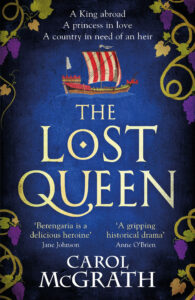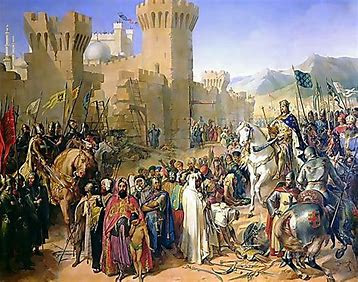Why Did Women Join the Crusades?
Why did women join Crusades? The importance of spiritual health during the medieval period cannot be underestimated. It was a way of cleansing the soul from the taint of sin, a penitential exercise and so there were female pilgrims. Yet, female visits to Holy Sites during menstruation was not acceptable to the Church. Monthly bleeding rendered women spiritually unpure. They were not deterred. One story circulated at the time concerning a woman who set out with her goose on the First Crusade- the goose led her and she followed it accompanied by a credulous crowd.
 The Lost Queen – Review
The Lost Queen – Review
Another strong novel by Carol McGrath told mostly through the eyes of two women – Berengaria of Navarre, (Richard the Lionheart’s wife) and Avelina of Middleton who sets out searching for her husband who was lost on a previous crusade, defending Outremer from Saladin’s forces. Both characters are fully realised and I particularly enjoyed meeting Berengaria, who like many women of the era was marrying for the convenience of political alliance.
Avelina’s strength is her determination, and she joins some nuns who are also travelling on pilgrimage and through a series of serendipitous encounters they meet up with the Royal entourage of Eleanor of Aquitaine, who is escorting Berengaria to meet her son. As a Queen, Berengaria never sets foot in England (thus, The Lost Queen) and I knew little about her from the outset, and learned the history as I went along, on Berengaria’s shoulder as she navigates snow-capped Alps, attacks by assassins and all manner of hardships during her long travels to meet a man, who quite frankly, is far more concerned with military supremacy than he is with any wife. I also really empathised with her as she has to deal with Eleanor of Aquitaine, who came across as a real gorgon of a prospective mother-in-law. Avelina’s role in the story as Berengaria’s friend really helped the reader understand the power of female friendship in those times.
Carol McGrath has a great way of uncovering little known Medieval women with fascinating lives and this is no exception. Her depth of knowledge of the period is apparent in all the tiny details of clothing, crafts, setting and courtly life. and her attention to detail in the similes she chooses – such as ‘her back straight as a stiff reed growing on a riverbank’. Carol McGrath never strays from the period.
The courtly life of poetry, song and chivalry is contrasted with the violence and bloodshed of war. Berengaria’s court and life in the Kingdom of Jersusalem gives a real immersion into a different way of living and highlights the turmoil that existed between different religious persuasions and the power-mongering of rival states. The book serves to highlight how women were often left behind by their men, often with little news about what had become of them.
If you love carefully researched historical fiction, with total command of the detail and the history, this is a book for you.
Highly recommended.
BUY THE BOOK1191 and the Third Crusade is underway . . .
It is 1191 and King Richard the Lionheart is on crusade to pitch battle against Saladin and liberate the city of Jerusalem and her lands. His mother, the formidable Eleanor of Aquitaine and his promised bride, Princess Berengaria of Navarre, make a perilous journey over the Alps in midwinter. They are to rendezvous with Richard in the Sicilian port of Messina.
There are hazards along the way – vicious assassins, marauding pirates, violent storms and a shipwreck. Berengaria is as feisty as her foes and, surviving it all, she and Richard marry in Cyprus and continue to the Holy Land. England needs an heir. But first, Richard and his Queen must return home . . .
The Lost Queen is a thrilling medieval story of high adventure, survival, friendship and the enduring love of a Queen for her King.
Acclaim for Carol McGrath’s ROSE trilogy:
‘Powerful, gripping and beautifully told’ KATE FURNIVALL on The Silken Rose
‘A tour de force of gripping writing, rich historical detail and complex, fascinating characters’ NICOLA CORNICK on The Stone Rose
‘A beautifully narrated novel’ K J MAITLAND on The Damask Rose

